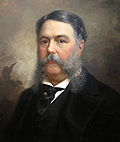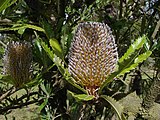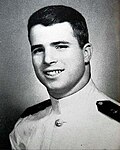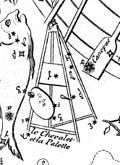| << | Today's featured articles for February 2016 | >> | ||||
|---|---|---|---|---|---|---|
| Su | Mo | Tu | We | Th | Fr | Sa |
| 1 | 2 | 3 | 4 | 5 | 6 | |
| 7 | 8 | 9 | 10 | 11 | 12 | 13 |
| 14 | 15 | 16 | 17 | 18 | 19 | 20 |
| 21 | 22 | 23 | 24 | 25 | 26 | 27 |
| 28 | 29 | |||||
February 1
Jean-Joseph Rabearivelo (1903?–1937) is Madagascar's national poet. He grew up impoverished and failed to complete secondary education, but taught himself the traditions of French literature and Malagasy poetry, and gained work in a publishing house as a proofreader and editor of its literary journals. He produced numerous poetry anthologies in French and Malagasy, as well as literary critiques, an opera, and two novels. After an early period of modernist-inspired poetry, the originality of his surrealist poetry garnered strong praise and drew attention in international poetry reviews. Nevertheless, Rabearivelo never gained support from colonial Madagascar's high society. He suffered personally and professionally: his three-year-old daughter died, the French authorities excluded him from the list of exhibitors at the Universal Exposition in Paris, and philandering and opium addiction worsened his debt. After his suicide by cyanide poisoning, he was hailed by literary figures including Léopold Sédar Senghor as Africa's first modern poet. A room has been dedicated to him in the National Library of Madagascar. (Full article...)
February 2
Radical Dreamers is a Japanese video game produced by Square (now Square Enix) in 1996 for the Nintendo Super Famicom's Satellaview add-on. It is a text-based visual novel in which the player takes the role of Serge, a young adventurer accompanied by Kid, a teen-aged thief, and Gil, a masked magician. The game is a gaiden, or side story, to the 1995 game Chrono Trigger in the Chrono series, and later served as inspiration for Chrono Cross. It features text-based gameplay with minimal graphics and sound effects, and was scored by composer Yasunori Mitsuda. Unlike many Satellaview titles, Radical Dreamers was not designed to lock after a certain number of play-throughs, so players owning an 8M Memory Pack onto which the game was downloaded can still play today. Square tried to integrate Radical Dreamers into the Japanese PlayStation port of Chrono Trigger as an Easter egg, but writer and director Masato Kato halted this and other releases, unhappy with the quality of his work. Though the game was never officially released abroad, ROM hackers completed an English fan translation in 2003. (Full article...)
February 3
"R U Professional" is a satirical electropop song by the American indie rock band the Mae Shi (pictured), inspired by a July 2008 outburst by actor Christian Bale on the set of Terminator Salvation. Bale was filming with actress Bryce Dallas Howard when he berated the director of photography, Shane Hurlbut, for walking into his line of sight. After an audio recording of the incident appeared on the website TMZ, the Mae Shi recorded their song, releasing it on YouTube and via download on MediaFire the next day, February 3, 2009. The song samples Bale's voice, repeating the word "professional" in the chorus. The lyrics reference several films the actor starred in, including Newsies, Swing Kids, American Psycho, and The Dark Knight. "R U Professional" attracted a generally positive reception by reviewers, and was praised as an effective parody. MTV compared its style to that of new wave groups like Devo, and the Los Angeles Times described it as a lively pop music tribute to the actor. El País noted that the song contributed to the viral spread of Bale's outburst online. (Full article...)
February 4
Abe Waddington (1893–1959) was a professional cricketer for Yorkshire who played in two Test matches for England, both against Australia in 1920–21. Between 1919 and 1927 he played 266 first-class cricket matches, taking a total of 852 wickets with his left arm fast-medium bowling. Capable of making the ball swing, Waddington was admired for the aesthetic quality of his bowling action. He first played for Yorkshire after the First World War, when the team had been weakened by injuries and retirements. He was effective for Yorkshire, but often inconsistent. A hostile bowler, he sometimes verbally abused opposing batsmen and questioned umpires' decisions, unusual behaviour in those days, and was found guilty of dissent and inciting the crowd in a game against Middlesex. A succession of injuries reduced his effectiveness and he retired from first-class cricket in 1927. He continued to play league cricket and worked for the family business, a fat-refining firm, but maintained his connection with Yorkshire cricket. After retiring from cricket he enjoyed some success as an amateur golfer. (Full article...)
February 5
HMS Courageous was the lead ship of the Courageous-class cruisers built for the Royal Navy during the First World War. Lightly armoured and armed with only a few heavy guns, the ship was designed to support the Baltic Project, a plan championed by First Sea Lord John Fisher to invade the German coast north of Berlin. Courageous was completed in late 1916 and spent the war patrolling the North Sea. The ship participated in the Second Battle of Heligoland Bight in November 1917 and was present when the German High Seas Fleet surrendered a year later. Courageous was decommissioned after the war, but rebuilt as an aircraft carrier during the mid-1920s. The ship could carry 48 aircraft compared to the 36 carried by the similar Furious on approximately the same tonnage. After recommissioning and a new career operating off Great Britain and Ireland, the ship briefly became a training carrier until resuming patrols, a few months before the start of the Second World War in September 1939. Courageous was torpedoed and sunk in the opening weeks of the war, with the loss of more than 500 crew members. (Full article...)
Part of the Battlecruisers of the world featured topic.
February 6
Hugh Beadle (1905–1980) served as Rhodesia's Chief Justice from 1961 to 1977. Opening a law practice in 1931, he became a member of the Southern Rhodesian Legislative Assembly for Godfrey Huggins's ruling United Party in 1939. He was Huggins's Parliamentary Private Secretary (1940–46), then a Cabinet minister until 1950, when he resigned to become a High Court judge. In 1961 he was knighted and appointed Chief Justice; three years later he joined the British Privy Council. As independence talks between Britain and Rhodesia stalled, Beadle sought a compromise. After Rhodesia's Unilateral Declaration of Independence (UDI) in 1965 he brought together Harold Wilson and Ian Smith, the prime ministers, for talks aboard HMS Tiger. Wilson afterwards castigated Beadle for not persuading Smith to settle. Beadle's recognition of Smith's post-UDI administration as legal in 1968 drew accusations from the British Prime Minister and others that he had furtively supported UDI all along, but his true motives remain the subject of speculation. He stayed in office after Rhodesia declared itself a republic in 1970, and remained a Privy Counsellor for the rest of his life.
February 7
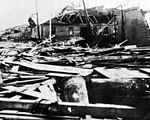
The 1928 Okeechobee hurricane was the second deadliest tropical cyclone ever in the United States, after the 1900 Galveston hurricane. The only major hurricane of its season, it struck Guadeloupe as a Category 4 storm on September 12, causing 1,200 deaths. The islands of Martinique, Montserrat, and Nevis also reported damage and fatalities. After sustained winds peaked at 160 mph (260 km/h) the next day, the storm became the only Category 5 hurricane ever to hit Puerto Rico; 24,728 homes were destroyed and 192,444 were damaged, leaving 312 people dead and over 500,000 homeless. Early on September 17, the storm made landfall in Florida near Lake Okeechobee with winds of 145 mph (233 km/h). The storm surge forced water out of the southern edge of the lake, spreading floodwaters as high as 20 feet (6.1 m) over hundreds of square miles. Houses were swept away in the cities of Belle Glade, Canal Point, Chosen, Pahokee, and South Bay, and at least 2,500 people drowned. The tropical storm also hit Georgia and the Carolinas. Overall, the system caused $100 million in damage and at least 4,079 deaths. (Full article...)
February 8
"Interactions" (premiered March 8, 2008) is the second episode of the animated television series The Spectacular Spider-Man, which is based on the comic book character Spider-Man, created by Stan Lee and Steve Ditko. In the episode, Spider-Man confronts the supervillain Electro, who has been contaminated by genetically modified electric eels that were being investigated as a potential source of clean energy. "Interactions" was directed by Troy Adomitis and written by Kevin Hopps, who researched numerous comic books that featured Electro. Electro is drawn to match his comic book appearance, though designer Victor Cook removed the character's customary star-shaped mask. Voice actor Crispin Freeman sought to reflect the character's declining sanity in his vocal style. "Interactions" aired on the Kids WB! block of The CW network. Its 1.4/4 Nielsen rating was higher than that of the pilot, "Survival of the Fittest". The episode received mixed reviews; IGN commended the episode for "some notable moments" but found it inferior to the pilot episode. (Full article...)
February 9
Youth on the Prow, and Pleasure at the Helm is an 1832 painting by English artist William Etty. It was inspired by a metaphor in Thomas Gray's poem The Bard in which the apparently bright start to the misrule of Richard II of England was compared to a gilded ship whose occupants are unaware of an approaching storm. Etty chose to illustrate Gray's lines literally, showing a golden boat filled with and surrounded by nude and near-nude figures. The Bard was about a curse on the House of Plantagenet placed by a Welsh bard following Edward I's attempts to eradicate Welsh culture, and critics felt that Etty had misunderstood its point. Some reviewers praised the piece, and in particular Etty's technical abilities, but audiences of the time found it hard to understand, and the use of nudity led some critics to consider the painting tasteless and offensive. It was bought in 1832 by Robert Vernon. In 1847 Vernon donated his collection to the National Gallery, which in turn transferred it to the Tate Gallery in 1949. Youth and Pleasure remains one of Etty's best-known works, and formed part of major exhibitions in 2001–02 and 2011–12. (Full article...)
February 10
Telopea truncata, commonly known as the Tasmanian waratah, is a plant in the family Proteaceae. It is endemic to Tasmania where it is found on moist acidic soils at altitudes of 600 to 1200 m (2000–4000 ft). A component of alpine eucalypt forest, rainforest, and scrub communities, T. truncata grows as a multistemmed shrub to a height of 3 metres (10 ft), or occasionally as a small tree, with red flower heads, known as inflorescences, that appear over the Tasmanian summer (November to February) and bear 10 to 35 individual flowers. Yellow-flowered forms are occasionally seen, but do not form a population distinct from the rest of the species. Collected by French botanist Jacques Labillardière in 1792–93, T. truncata was first described in 1805. Genetically the most distinctive of the five waratah species, Tasmanian waratah can be cultivated in temperate climates, requiring soils with ample moisture and good drainage and in partly shaded or sunny positions. Several commercially available cultivars have been developed that are hybrids of T. truncata with the New South Wales waratah (T. speciosissima) and Gippsland waratah (T. oreades). (Full article...)
February 11
Josiah Willard Gibbs (1839–1903) was an American scientist who made important theoretical contributions to physics, chemistry, and mathematics. His work on the applications of thermodynamics was instrumental in transforming physical chemistry into a rigorous deductive science. Together with James Clerk Maxwell and Ludwig Boltzmann, he created statistical mechanics (a term that he coined), explaining the laws of thermodynamics as consequences of the statistical properties of large ensembles of particles. Gibbs also worked on the application of Maxwell's equations to problems in physical optics. He invented modern vector calculus, independently of Oliver Heaviside's similar work. In 1863, Yale awarded Gibbs the first American doctorate in engineering. He was a professor of mathematical physics at Yale from 1871 until his death. Working in relative isolation, he became the earliest theoretical scientist in the United States to earn an international reputation, and in 1901 he was awarded the Copley Medal of the Royal Society of London. He was praised by Albert Einstein as "the greatest mind in American history". (Full article...)
February 12
The Alpine chough (Pyrrhocorax graculus) is a bird in the crow family, one of two species in the genus Pyrrhocorax. Its two subspecies breed in high mountains from Spain east through southern Europe and North Africa to Central Asia, India and China. It has nested at 6,500 m (21,300 ft), higher than any other bird species, and its eggs have adaptations that improve oxygen intake and reduce water loss at these altitudes. This bird has glossy black plumage, a yellow bill, and red legs. Widely spread flight feathers allow acrobatic manoeuvres. A large bird with distinctive whistling calls, it pairs for life and displays fidelity to its breeding site, usually a cave or crevice in a cliff face. Building a lined stick nest, it lays three to five brown-speckled pale beige eggs. It feeds on fruit in winter and mainly invertebrate prey in grazed grassland in summer. Although some localised populations have declined due to predation, parasitism and changes in agricultural practices, this widespread and abundant species is not threatened globally. Climate change may present a long-term threat by shifting the bird's alpine habitat even higher. (Full article...)
Part of the Chough featured topic.
February 13
The Royal Australian Air Force (RAAF) operated 24 McDonnell Douglas F-4E Phantom II fighter-bombers between 1970 and 1973. The aircraft were leased from the United States Air Force (USAF) as an interim measure owing to delays in the delivery of the RAAF's General Dynamics F-111C bombers. The F-4C Phantom was evaluated by the RAAF in 1963 as a possible replacement for the English Electric Canberra, but was judged unsuitable. The F-111 was selected instead, but when technical faults delayed the project, the RAAF decided that the F-4E would be the best alternative. The Australian and US governments negotiated an agreement in 1970 for the RAAF to lease 24 F-4Es from the USAF. The Phantoms entered service in September that year, and proved highly effective. They prepared aircrew to operate the sophisticated F-111, and the training program improved the RAAF's professional standards. One of the F-4Es was destroyed in an accident in June 1971, and another was repaired by the RAAF after it was damaged in a crash landing. The 23 surviving aircraft were returned to the USAF in two batches during October 1972 and June 1973. (Full article...)
February 14
Asmara Moerni (Indonesian for True Love) is a 1941 romance film from the Dutch East Indies (now Indonesia) produced by Ang Hock Liem for Union Films. The film was written by Saeroen and directed by Rd Ariffien. It follows Dr. Pardi (Adnan Kapau Gani), who is stunned to find that his childhood playmate, the family's maid Tati (Djoewariah), has grown up to be a beautiful woman. When his mother tells him he should marry quickly, he says only that he already has someone in mind, aware that his mother would never approve an inter-class marriage. Tati, meanwhile, is engaged to Amir (S. Joesoef), who falls victim to a car accident after many adventures. On his deathbed, Amir asks Pardi to take care of Tati; the two are later married. The black-and-white film was cast and advertised to cater to the growing native intelligentsia: Ariffien was part of the nationalist movement, Gani was a medical doctor, and advertisements emphasised the film's departures from the stage traditions which dominated the local film industry. Despite mixed reviews, Asmara Moerni was a commercial success. As with most films of the Indies, it may be lost. (Full article...)
Part of the Union Films featured topic.
February 15
Chester A. Arthur (1829–1886) was the 21st President of the United States, from 1881 to 1885. After practicing law in New York City, he served as quartermaster general in the New York Militia during the American Civil War. Rising quickly in the Republican political machine run by Senator Roscoe Conkling, he was appointed to the lucrative post of Collector of the Port of New York in 1871. In 1878 the new president, Rutherford B. Hayes, fired Arthur as part of a reform measure. When James Garfield won the Republican nomination for president in 1880, Arthur was nominated for vice president to balance the ticket. After Garfield's assassination, Arthur took up the cause of reform, supporting the Pendleton Civil Service Reform Act. He presided over the rebirth of the U.S. Navy but was criticized for failing to alleviate a growing federal budget surplus. Suffering from poor health, Arthur retired at the close of his term. Journalist Alexander McClure later wrote, "No man ever entered the Presidency so profoundly and widely distrusted as Chester Alan Arthur, and no one ever retired ... more generally respected, alike by political friend and foe." (Full article...)
February 16
Fort Yellowstone was established as a U.S. Army cavalry post in 1891 at Mammoth Hot Springs in Yellowstone National Park. The army administered the park from then until 1918 when it was transferred to the newly created National Park Service. The first structures (1891–1897) were mainly wood-framed buildings in what has been called the "cottage style", some with Colonial Revival elements. Later structures (1908–1913), including the current park headquarters and the Horace Albright Visitor Center, were primarily built from locally quarried sandstone, and many of these are still in use as administrative offices, residences for National Park Service employees, and museums. The army left a legacy of policies and practices that served as precedents for the National Park Service's management of national parks, including wildlife management, protection of natural features, and prosecution of illegal activities. A version of the campaign hat worn by members of the army during the last years of their management of Yellowstone National Park was adopted by the National Park Service's Park Rangers. (Full article...)
February 17
Myles Standish (c. 1584 – 1656) was an English military officer hired by the Pilgrims as military advisor for the Plymouth Colony. One of the Mayflower passengers, Standish played a leading role in the administration and defense of the colony from its inception. On February 17, 1621, the colony militia elected him as its first commander and continued to re-elect him to that position for the remainder of his life. He served as an agent of Plymouth Colony in England, and as assistant governor and treasurer of the colony. He was also one of the first settlers and founders of the town of Duxbury, Massachusetts. As a military leader, Standish favored preemptive action, sometimes angering Native Americans and disturbing more moderate members of the colony. By the 1640s, he relinquished his role as an active soldier and settled into a quieter life on his Duxbury farm. Several towns and military installations have been named for Standish, and monuments have been built in his memory. The popularity of the fictionalized book The Courtship of Miles Standish by H. W. Longfellow helped to cement the Pilgrim story in US culture. (Full article...)
February 18
The 2012 Budweiser Shootout was the first exhibition stock car race of the 2012 NASCAR Sprint Cup Series. It was held on February 18, 2012, before a crowd of 82,000 in Daytona Beach, Florida, at the Daytona International Speedway, one of six superspeedways to hold NASCAR races. The 82-lap race was won by Kyle Busch (pictured) of the Joe Gibbs Racing team. It was Busch's first victory in the event; Tony Stewart finished second and Marcos Ambrose came in third. The race saw twenty-six lead changes, shared among thirteen drivers. Before the first turn, pole position driver Martin Truex, Jr. was passed by Jeff Gordon, and at the end of the first lap, Dale Earnhardt, Jr. led. On the ninth lap, a multiple-car accident prompted the first caution flag. Sixteen laps later the second caution was issued, with Jamie McMurray leading. During the caution period, all teams made pit stops. On lap 62 Gordon reclaimed the lead and held it until his car hit the wall and rolled over, prompting the fifth and final caution. Stewart took the lead, but in the final lap, Busch passed him to win. The race attracted 7.46 million television viewers. (Full article...)
February 19
The Battle of Kalavrye was fought in 1078 between the Byzantine imperial forces of general (and future emperor) Alexios Komnenos (pictured) and a force led by the rebellious governor of Dyrrhachium, Nikephoros Bryennios the Elder. Bryennios had rebelled against Michael VII Doukas (reigned 1071–78) and had won over the allegiance of the Byzantine army's regular regiments in the Balkans. Even after Doukas's overthrow by Nikephoros III Botaneiates (r. 1078–81), Bryennios continued his revolt, threatening Constantinople. After failed negotiations, Botaneiates sent the young general Alexios Komnenos to confront him. The two armies clashed at Kalavrye on the Halmyros river. Komnenos, whose army was considerably smaller and far less experienced, tried but failed to ambush Bryennios's army, which in turn fell into disorder after its own Pecheneg allies attacked its camp. Reinforced by Turkish mercenaries, Alexios lured the troops of Bryennios into another ambush through a feigned retreat. The rebel army broke, and Bryennios himself was captured. This is one of the few battles that was described in detail by Byzantine sources. (Full article...)
February 20
"Rehab" is a song recorded by Barbadian singer Rihanna (pictured) for her third studio album, Good Girl Gone Bad (2007). Def Jam Recordings serviced the song to contemporary hit radio in the United States on October 6, 2008, as the eighth and final single from the album, and released it in Britain as a CD single on December 8. Development of "Rehab" began while Rihanna was accompanying Timbaland on Justin Timberlake's FutureSex/LoveShow tour in 2007. Timberlake wrote the song in collaboration with its producers, Hannon Lane and Timbaland, and provided additional vocals. It is a mid-paced R&B song with an emotional, melancholy chorus; the lyrics are about the protagonist's painful memories of her former lover, who is portrayed metaphorically as a disease. Critics were divided on the song's production and composition, some comparing the structure to that of Timberlake's 2007 single "What Goes Around... Comes Around". The accompanying music video, directed by Anthony Mandler, was shot in Vasquez Rocks Park near Los Angeles, and won the Urban Music Award for Best Music Video. (Full article...)
February 21
Anarky is a fictional character in comic books published by DC Comics. Co-created by Alan Grant and Norm Breyfogle, he first appeared in Detective Comics No. 608 (November 1989), as an adversary of Batman. A former child prodigy driven to overthrow governments to improve social conditions, he has espoused environmentalism, antimilitarism, economic equality, and especially anti-statism. Anarky was used as a sporadically recurring character throughout the early 1990s, following a positive reception by readers, and experienced a brief surge in media exposure during the late 1990s. The 1997 spin-off series Anarky generated positive reviews. In 2008, he reappeared in an issue of Robin, and then became a recurring character in issues of Red Robin, authored by Fabian Nicieza, until the series was cancelled in 2011. Since 2013 Anarky has been featured more heavily in media adaptations of DC Comics properties, across multiple platforms. He made his live action debut in 2015 in Arrow, a television series based on the Green Arrow character, where he was portrayed by Alexander Calvert, once again as a villain. (Full article...)
February 22
Banksia aemula, commonly known as the wallum banksia, is a shrub of the family Proteaceae. Found from Bundaberg south to Sydney on the Australian east coast, it is encountered as a shrub or a tree up to 8 m (26 ft) tall in coastal heath on deep sandy soil known as Wallum. It has wrinkled orange bark and shiny green serrated leaves, with green-yellow flower spikes, called inflorescences, appearing in autumn. The flower spikes turn grey as they age and large grey follicles appear. B. aemula resprouts from its woody lignotuber after bushfires. Aemula, Latin for "similar", comes from its resemblance to the closely related Banksia serrata. First described by the botanist Robert Brown in the early 19th century, it was known for many years in New South Wales as Banksia serratifolia. This name, originally coined by Richard Anthony Salisbury, proved invalid, and since 1981 Banksia aemula has been accepted as the scientific name. A wide array of mammals, invertebrates, and birds, particularly honeyeaters, visit the inflorescences and are instrumental in pollination. It is grown as a garden plant, but less commonly than B. serrata. (Full article...)
February 23
The military career of John McCain included attack aircraft missions as a naval aviator in the Vietnam War followed by internment for more than five years as a prisoner of war. His father and grandfather were admirals in the United States Navy. Born in 1936 in the Panama Canal Zone, McCain graduated in 1958 from the U.S. Naval Academy, where his rebellious attitude resulted in a low standing. Off the coast of Vietnam, he narrowly escaped death in the 1967 Forrestal fire. On a bombing mission in October 1967, he was shot down over Hanoi and badly injured in the crash before enduring periods of torture as a prisoner of war. In 1968, he refused a North Vietnamese offer of early release, because it would have meant leaving before other prisoners who had been held longer. He was released in 1973 after the Paris Peace Accords. Upon his return, McCain studied at the National War College and commanded a large training squadron in Florida. In 1979 he was promoted to captain and became the director of the navy's Senate Liaison Office. McCain has been a U.S. Senator from Arizona since 1987, and was the Republican nominee in the 2008 presidential election. (Full article...)
February 24
Æthelberht was King of Kent from about 589 until his death on 24 February 616. Bede lists him in the Ecclesiastical History of the English People as the third king to hold imperium over other Anglo-Saxon kingdoms, and he is called a bretwalda or "Britain-ruler" in the Anglo-Saxon Chronicle. Æthelberht's law, the earliest written code in any Germanic language, instituted a complex system of fines. Coins may have begun to circulate in Kent during his reign for the first time since the Anglo-Saxon settlement of Britain. His marriage to Bertha, the Christian daughter of Charibert, king of the Franks, built an alliance with the most powerful Western European state. Æthelberht became the first English king to convert to Christianity, shortly after the arrival of Pope Gregory I's missionary Augustine in 597. Churches were established, and wider-scale conversion to the religion began in the kingdom. Æthelberht provided the new church with land in Canterbury, thus establishing one of the foundation stones of what ultimately became the Anglican church. He later came to be regarded as a saint; his feast day is 25 February. (Full article...)
February 25
The African river martin (Pseudochelidon eurystomina) is a perching bird, one of two members of the river martin subfamily of the swallow family, Hirundinidae. First described by German zoologist Gustav Hartlaub in 1861, the African river martin was not at first recognised as a swallow, but was later placed in a separate subfamily shared with the Asian white-eyed river martin. A large swallow with a variety of unmusical calls, it is mainly black with a blue-green gloss to the head and a greener tint to the back and wings, and has red eyes, a broad orange-red bill and a square black tail. Young birds are similar in appearance, but with browner plumage. It displays both in flight and on the ground. The main breeding areas are in the Democratic Republic of the Congo along the Congo River and its tributary, the Ubangi, in habitats characterised by a mixture of tropical forest types including swampy or seasonally flooded woodland. The African river martin is migratory, wintering in coastal savanna in southern Gabon and the Republic of the Congo. It nests in burrows in sand banks, and in winter digs tunnels for night-time shelter. (Full article...)
Part of the River martin featured topic.
February 26
Halo Wars (released 2009) is a real-time strategy video game developed by Ensemble Studios and published by Microsoft Game Studios for the Xbox 360 video game console. The game is set in the science fiction universe of the Halo series in the year 2531, 21 years before the events of Halo: Combat Evolved. The player leads human soldiers aboard the warship Spirit of Fire in an effort to stop an ancient fleet of ships from falling into the hands of the genocidal alien Covenant. Halo Wars was unveiled at the 2006 X06 Xbox show. Ensemble was closed by Microsoft before the game's release, but Robot Entertainment was founded soon after by many of Ensemble's former employees; this new company continued to support Halo Wars with updates and downloadable content. The game received generally positive reviews. Reviewers lauded the game's pre-rendered cinematics, attention to detail in replicating the Halo universe, and intuitive control scheme. Complaints against the game included the lack of an option to play as the Covenant faction in campaign mode as well as the lack of strategic options during play. The game sold one million units worldwide through March 2009. (Full article...)
February 27
Arthur W. Radford (1896–1973) was a U.S. Navy admiral and naval aviator. In over 40 years of military service, he held a variety of posts including Vice Chief of Naval Operations, commander of the Pacific Fleet and Chairman of the Joint Chiefs of Staff. Radford's first sea duty was aboard the battleship USS South Carolina during World War I. In the first years of World War II, he was the architect of the navy's aviator training programs. In its final years he commanded aircraft carrier divisions through several campaigns of the Pacific War. Noted as a strong-willed and aggressive leader, Radford was a central figure in the post-war debates on U.S. military policy, and was a staunch proponent of naval aviation. He defended the Navy's interests in an era of shrinking defense budgets during the 1949 "Revolt of the Admirals", a contentious public fight over policy. As Chairman of the Joint Chiefs, he advocated a strong nuclear deterrent in support of the New Look policy of President Dwight Eisenhower. He retired from the military in 1957. He was the namesake of the Spruance-class destroyer USS Arthur W. Radford. (Full article...)
February 28
Pictor (Latin for "painter") is a small faint constellation between the brilliant star Canopus and the Large Magellanic Cloud in the Southern Celestial Hemisphere. Normally represented as an easel, Pictor was invented and named by Nicolas Louis de Lacaille in the 18th century. The constellation's brightest star is Alpha Pictoris, a white main sequence star of apparent magnitude 3.3. Pictor also hosts RR Pictoris, a cataclysmic variable star system that flared up as a nova in 1925, reaching magnitude 1.2. Pictor's second-brightest star, Beta Pictoris, is surrounded by an unusual dust disk rich in carbon. HD 40307, an orange dwarf, has six planets orbiting it, one of which—HD 40307 g—is a potential super-Earth in the circumstellar habitable zone. Kapteyn's Star, the nearest star in Pictor to Earth, is a red dwarf 12.76 light-years away that was found to have two super-Earths in orbit in 2014. Pictor A is a radio galaxy that is shooting a jet of plasma 800,000 light-years long from a supermassive black hole at its centre. In 2006, a gamma ray burst—GRB 060729—was observed in Pictor; its X-ray afterglow was detectable for nearly two years afterwards. (Full article...)
February 29
Regents of the University of California v. Bakke was a landmark Supreme Court decision in 1978 upholding affirmative action. It found diversity in the classroom to be a compelling state interest and allowed race to be one of several factors in college admission policy, but rejected specific quotas, such as the 16 out of 100 seats set aside for minority students by the UC Davis School of Medicine. Although the court had outlawed segregation in schools, it had not resolved the legality of voluntary affirmative action programs initiated by universities. Proponents deemed such programs necessary to make up for past discrimination, while opponents believed they violated the Equal Protection Clause of the Fourteenth Amendment. The case fractured the court: the nine justices issued a total of six opinions. The judgment of the court was written by Justice Lewis Powell, and two different blocs of four justices joined various parts of Powell's opinion. The decision had little practical effect on most affirmative action programs. In 2003 the court upheld Powell's position in a majority opinion in Grutter v. Bollinger. (Full article...)








